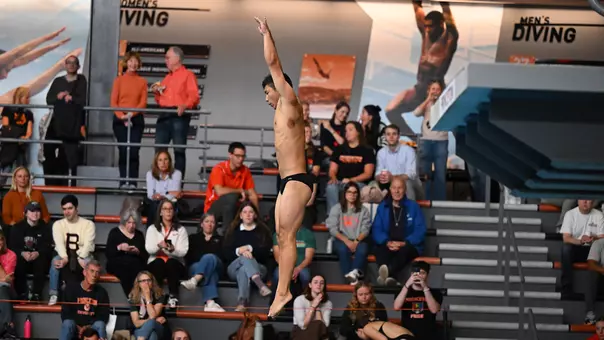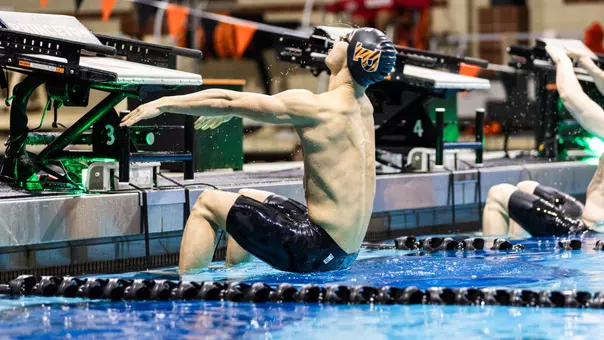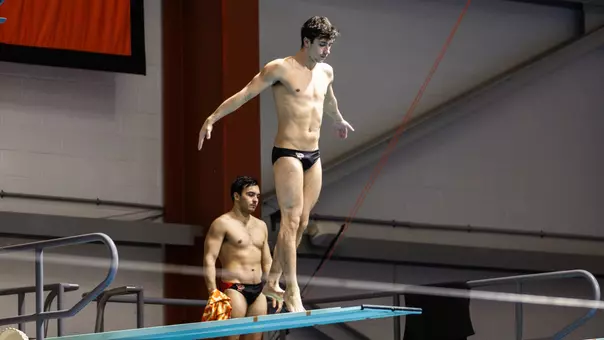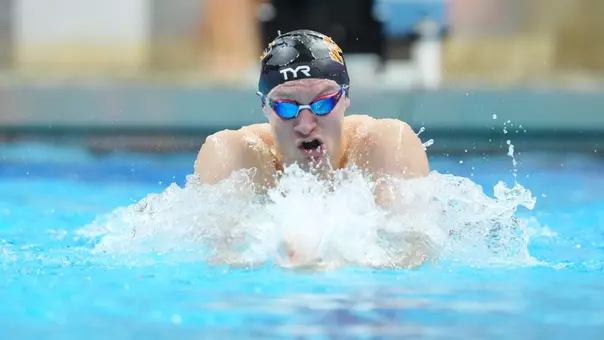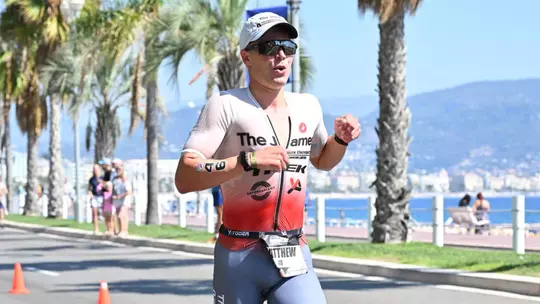
Uncharted Waters: Matthew Marquardt ’21 Combines Pro Triathlon Career With Medical School
9/25/2023
First, he climbed Mt. Kilimanjoaro to raise money for the Make-A-Wish Foundation to support a close friend who was in a battle with cancer.
Then, he biked across the USA to raise money for St. Jude’s Children’s Hospital and its mission of treating and finding cures for children’s cancer.
Now, Matthew Marquardt ’21 is combining medical school with a professional triathlon career and donating a percentage of his prize money to innovative cancer research at the Ohio State University Comprehensive Cancer Center – Arthur G. James Cancer Hospital and Richard J. Solove Research Institute.
That’s right – Marquardt is combining medical school at Ohio State with a professional triathlon career. A portion of his prize money is going to Peletonia, an annual bike ride and community event in Columbus that raises money for the James Cancer Center at OSU.
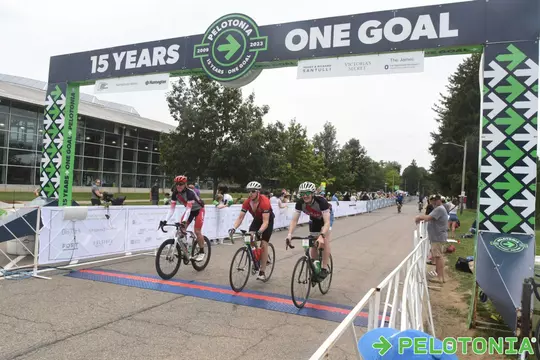
Marquardt is forging an entire new path. There have been medical school students who have competed in triathlons in the past, but never at this level. A part-time pro who is producing world class results, Marquardt recently finished 11th at the World Championships in Nice, France, and was first out of the water with a time of 47:46. Unable to devote all his time to training and recovery like other professional triathletes due to the demands of medical school, Marquardt has been making a name of himself in the triathlon world, being highlighted on the official IronMan social media accounts.
Within Marquardt there lies a drive – a service-minded motivation that has guided many of his life's major decisions.
“Cancer has had a big role in my life, said Marquardt. "I've known a lot of people who’ve had cancer, including a mentor who had head and neck cancer. There’s a personal motivation to do it and it’s also what’s driven me in triathlon. When it became apparent I might have a future in triathlon about a year and a half ago, I started thinking about how I could do it differently. When I did the bike across the country, I wanted to make it about more than just myself, that’s why I added the fundraiser component to it. I wanted to do the same thing for triathlon.”
Marquardt’s previous adventures up Mt. Kilimanjaro and across the US were to raise money for charity, so this endeavor is nothing new. In 2021, his senior year, Marquardt was a recipient of the Art Lane ’34 Award, given annually to an undergraduate Princeton athlete in recognition of his or her selfless contribution to sport and society. It was a well-deserved honor; in addition to his cross-country bike ride, Marquardt became the first Princetonian to receive the Slavin fellowship for entrepreneurship, while also being honored at Princeton Research Day for his work on solar powered windows. He led numerous research studies on campus related to student sleep habits and developed the TigerDen Sleep Workshop to improve mental health and performance via sleep. Marquardt also serve as a tutor for underprivileged first and second graders, and as a Patient Care Ambassador at the Princeton Medical Center.
Sponsors are a necessary part of triathlon and Marquardt does have them, but he feels a greater purpose than just winning for himself and winning prize money. Over the past 15 years, Peletonia has raised over 275 million dollars and become very much a movement within Columbus. Bumper stickers with the logo adorn people’s cars and around Columbus there are barns that have been painted with the iconic green arrow. The powerful community event has been inspiring to Marquardt.
“When I got to Columbus and learned about Peleotonia I knew that’s what I wanted to do it for,” explained Marqaurdt. “I knew I wanted to try and make this bike ride more well-known around the country and support it every way I could. That’s why the James Cancer Center is the title logo on my kit.”
After his cross-country bike trip in 2021, Marquardt returned to campus and was looking for something athletic to do in the short term given the swimming and diving season was canceled due to the COVID-19 pandemic. He had no aspirations of an athletic career post-Princeton and was content to focus solely on medical school.
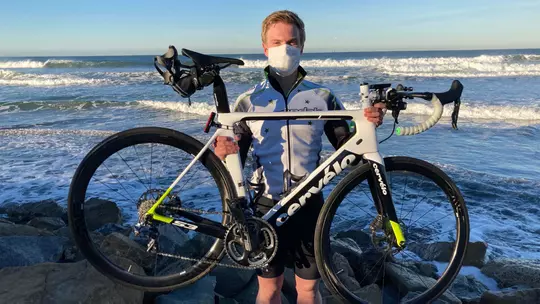
In what was an unsurprising move to those who know him, Marquardt signed up for a half-Ironman the day before Princeton’s commencement ceremony. He “trained for a bit” and had to borrow a bike and a wetsuit to compete at the IronMan Gulf Coast 70.3 but finished fourth out of 1,400 people with an impressive time of 4:05.00.
“I finished the triathlon, drove five and a half hours from Panama City Beach to Atlanta,” said Marquardt. “I then flew from Atlanta to New Jersey, got in at midnight then graduated the next morning.”
Marquardt’s result qualified him for the IronMan 70.3 World Championships in September 2021, which was six weeks into medical school. At the time, he figured he’d give it a shot and call time on his triathlon career afternoon the World Championships.
That summer, Marquardt went on a mountain biking trip with his brother but did not train overly hard. That fall, he competed at the IronMan 70.3 World Championships in St. George, Utah, and finished second in his age group. At that point his potential to be elite in the sport started to become clear. His coach told him he needed to stay in it, that he was too good to give it up.
Initially, Marquardt pushed back due to medical school, lack of time and self-doubt. He struggled with the idea of devoting 20 hours a week to train for something when he could be doing research or something he felt others cared more about.
“I wasn’t convinced being elite at a physical activity was valuable like it is in college,” said Marquardt. “There are benefits to being a national champion or varsity athlete in terms of career progression, but I wasn’t convinced.”
However, Marquardt would overcome these doubts.
He connected with various mentors and asked them if he should pursue the sport in addition to medical school and the response he got was a resounding yes. He learned of studies undertaken to determine was makes a successful resident, and the only thing the studies showed was being elite at something before medicine. Test scores weren’t predictive, neither was how you did in medical school. The only thing that mattered was being elite at something else whether it was a sport, an instrument, writing or any other activity. If he could be elite at triathlon, it would really set him apart.
Who else had been a professional triathlete in medical school?
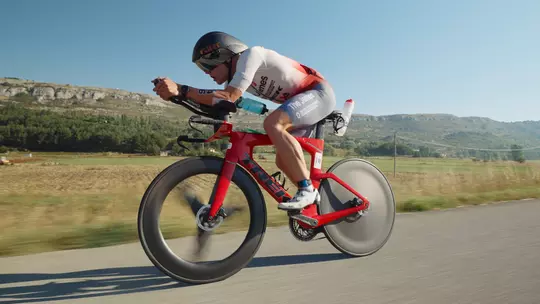
The original plan called for one full season, and it was a season that ended up going much better than anticipated. Early mornings and two-a-days were the norm, along with a five or six-hour workout on the weekend. Suffice to say it was a lot to balance.
“Over that winter everyone in my med school class thought I was crazy,” said Marquardt. “I didn’t have any substantial results yet. I knew what I was doing with my training and trusted my coach but didn’t have any race results to back that up.”
Eventually, spring came and so did the results. His debut came in April at the IronMan Texas, an event consisting of 2,200 people where Marquardt won the overall age group race and finished 10th amongst the professionals. It was at that moment he acknowledged his coach was right and there was the something special there worth pursuing. Marquardt’s hard work and self-described “slight gamble” over the winter had paid off.
That season saw Marquardt enter more races and win all of them, with his biggest margin coming in the IronMan Lake Placid in July 2022 where he finished fourth amongst the professionals and won the amateur division by 50 minutes.
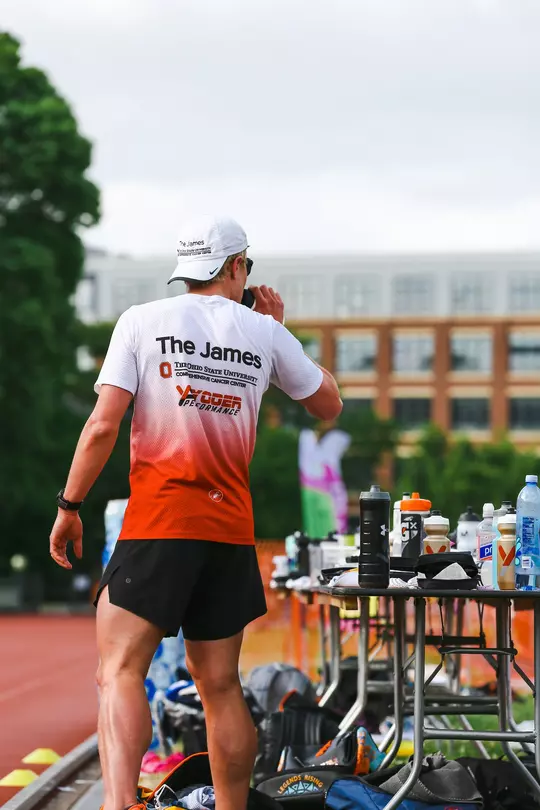
As that summer became fall, year two of medical school began for Marquardt in August. The World Championships took place in the second week of October in Kona, Hawaii, and Marquardt was forced to deal with adversity in multiple different forms in the lead up to the event. He suffered an infection three days before the race and his bike was damaged in transit to Kona, forcing him to scramble to find a replacement. The week leading up to the World Championships was his final exam week for one of his hardest blocks in medical school. As he’s done time and time again, Marquardt overcame the adversity and won the overall title for amateurs. He could officially call himself a World Champion.
2023 has been Marquardt’s biggest year yet, his first as a professional. Mid-March was his first major boards exam, then in April he competed in the IronMan Texas and finished third with a time of 7:45.12. It was the third-fastest debut time for the IronMan distance ever and at the time, the second-fastest time ever by an American.
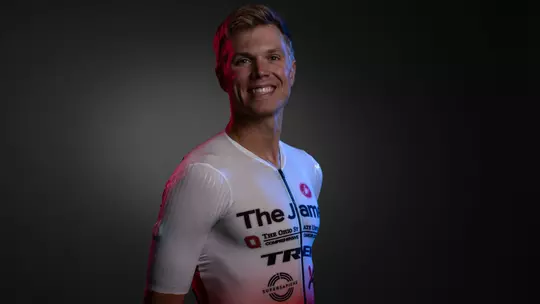
“It was a really fun race,” explained Marquardt. “I started the run three minutes behind the guys in first and second place and was able to close that gap to eight seconds behind second place and 21 seconds behind first place. It was the equivalent of a photo finish for an IronMan race, and it was one of the closest podiums ever in IronMan history.”
In June, Marquardt finished second at the IronMan Coeur d’Alene. Then, in August, came the World Championships in Nice, France, where he famously earned an 11th-place finish.
“I didn’t have the best bike and was really struggling, explained Marquardt. “When I came into T2, the second transition after the bike, I got off and nearly collapsed because my legs were shot. It was a four-loop run course and I didn’t think I was going to pass the first loop but somehow, I was able to find my legs. I was 17th when I started the run and was able to pull in front of those people and finish 11th overall.”

Marquardt’s first professional triathlon season has coincided with a research year where he’s using 3D printing to help cancer surgeons plan before their surgeries. The goal is to help surgeons better perform their surgeries, giving them a device to bend their plates and make it easier to cut in the right place, in addition to visualizing where they need to take out the cancer. The research is funded by a Peletonia fellowship and gives Marquardt the flexibility for endeavors like the IronMan World Championships.
Balancing medical school with training 20 hours per week plus recovery is not for the faint of heart. However, there is an upside. Marquardt has gained a greater understanding of the human body and its biology, which has been a key to his success. Given that at Princeton he devoted significant time to researching and studying sleep, an area often regarded as neglected in medical school, Marquardt has used this knowledge to his benefit to the best of his abilities. While he admits he isn’t perfect, he understands how it impacts areas like nutrition and the body’s ability to gain strength. Marquardt also has a greater comprehension of how to bounce back from a week of sleep deprivation.
Many consider the fourth component of triathlons to be fueling, given its an eight-hour race where you burn roughly 6,000 calories. The body’s muscles don’t have glycogen to sustain themselves, so being able to eat and eat often during races is integral.
“Understanding how your body mechanistically absorbs different types of fuel and how different certain products work at a deeper level has really helped me," proclaimed Marquardt. "It’s been one of my big strengths. We base my training a lot on lactate, we measure it during workouts to make sure I’m not over-doing it or under-doing it metabolically, so we hit a specific metabolic intensity during workouts.”
Often, athletes will view how hard they’re working as the main thing impacting lactate. While it is an important input, Marquardt is also aware that how he slept the night before, what he eats during workouts along with his hydration status are all key factors. This greater understanding of the body’s underlying biology has enabled Marquardt to know when to push more or pull back slightly, thus maximizing the result of his training and minimizing the risk of injury.
True to his forward-thinking nature, Marquardt began using a continuous glucose monitor to measure his blood sugar levels.
“It’s an emerging space,” said Marquardt. “When you’re working out you want your blood sugar to be pretty high, so your muscles have enough fuel. Understanding how different transporters in the body work and what the blood glucose values mean in different contexts has been valuable to me and help me make sure I’m fueling and recovering well.”
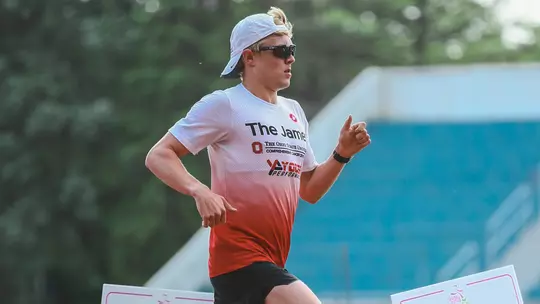
Long term, Marquardt sees himself doing head and neck surgery with a focus on head and neck cancer. This would require a five-year Ear, Throat, and Nose residency with a two-year fellowship on top of it. The wide variety of cases is one of the major factors that attracts Marquardt, with surgeries ranging from one hour to 10-12 hours and requiring multiple surgeons.
The intersection of athletic performance and medicine has also become highly intriguing to Marquardt, and he hopes to create a niche for himself in that space using athletics to improve outcomes in patients, especially cancer patients. He believes there is much medicine can learn from athletics, the way athletes are treated, and the way athletes recover. Marquardt sees much overlap between the two areas that have dominated his life.
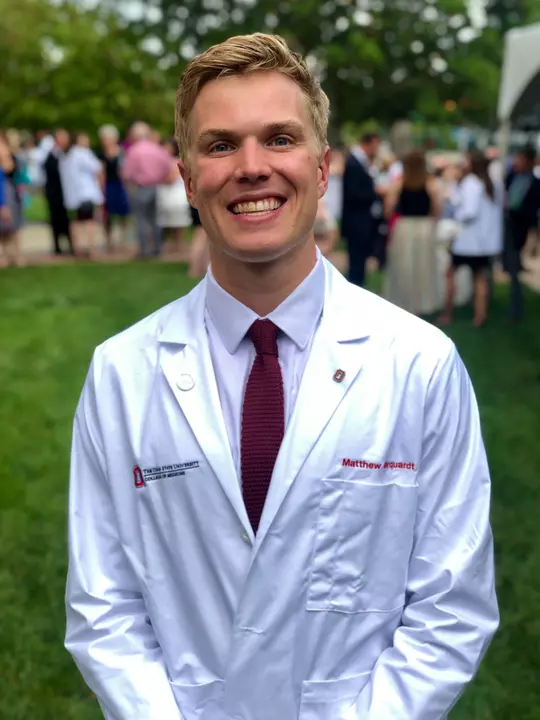
Athletics and medicine went hand-in-hand for Marquardt at Princeton, and that experience has been invaluable in helping him juggle triathlon and medical school. The 20 hours per week he currently trains has been translatable to the time he spent training as a member of the Tigers’ men’s swimming & diving team. The time management he learned at Princeton along with the ability to perform at a high level both athletically and academically has been key. He describes the challenge at Princeton as cognitive and conceptual, spending lots of time trying to understand how concepts work and then applying the, but not necessarily dealing with a huge volume of information. Marquardt views the type of learning at medical school as different with more of a focus on sorting through, memorizing and prioritizing a large amount of information.
“Princeton has been instrumental in my ability to do both triathlon and medical school," said Marquardt. "I was a chemistry major, pre-med, and on the swim team so I’d like to think I was in one of the hardest majors in one of the hardest schools in the country in one of the hardest sports," said Marquardt. "Medical school hasn’t been easy, but it’s been very translatable. I’ve felt the challenge of medical school has been like the challenge of Princeton in terms of time management and academic challenge.”
Through all of it, Princeton has been an active part of Marquardt’s journey. When Marquardt first started out, he didn’t own a triathlon bike and borrowed one from a Princeton men’s swimming & diving alum. It was on that bike Marquardt later won the Amateur World Championship in Kona.
Marquardt also received an assist from another member of the Princeton athletics family, men’s lightweight rowing Head Coach Marty Crotty, owner of a company called Princeton CarbonWorks Wheels. First hearing about Marquardt during his cross-country ride, Crotty was so impressed by the short time it took Marquardt to cover the distance, so he reached out to offer him a set of his company’s wheels should he ever want to go faster. Given that those wheels had just won a world championship on the bike of the fastest man in the world, Filippo Ganna, Marqaurdt needed little convincing. He responded to Crotty, gratefully took him up on the offer and explained he was about to compete in his first IronMan race and lacked any of the faster equipment.
“During his rise I’ve heard from numerous seasoned experienced career professionals that are just shaking their heads at his raw talents,” articulated Crotty. “The sky is the limit for Matthew Marquardt in this sport. It’s hard to overstate just how much he has accomplished in such a short time.”

What Marquardt has already accomplished is unprecedented, but he’s just getting started. He never expected to be doing this and doesn’t have a template to follow and there lies much of the fun and excitement of his journey.
“The point being there’s no path, I’m making it as I go and that’s really cool,” said Marquardt. “My ultimate goal is to get a podium at a World Championship race, top-three.”
Princeton men’s swimming & diving Head Coach Matt Crispino knows Marquardt better than most. He’s been through the grind of multiple swimming and diving seasons with him and all the ups and downs that come with it. Crispino has seen it all from Marquardt and isn’t surprised to see him forging this unique path and setting the loftiest of goals.
“From the first time I met Matthew, I knew he was someone whose name the rest of the world would come to know,” said Crispino. “While most would be surprised that someone can attend medical school while also becoming a world title contender in the most grueling sport in the world, the Princeton Swimming & Diving family is not surprised in the least.
Throughout his Princeton career, Matthew showed a special ability to seemingly bite off more than he can chew … and then chew anyway. He was always up for a challenge, so choosing the most dauntingly challenging combination of activities is a very ‘Marquardt’ thing to do. We are incredibly proud of what he’s accomplished – finishing 11th in the world at the full Ironman distance (in his first year as a pro) is no small feat. But we’re even more proud of the impact he’s having and will continue to have in his community. He truly embodies the Princeton mantra of living ‘in the service of humanity.’
All our student-athletes are charged with leaving our program better than they found it. Every day, we see evidence that Matthew succeeded in that endeavor."
For more on Peletonia, CLICK HERE.
For more on Matthew Marquardt’s Peletonia profile, CLICK HERE.


